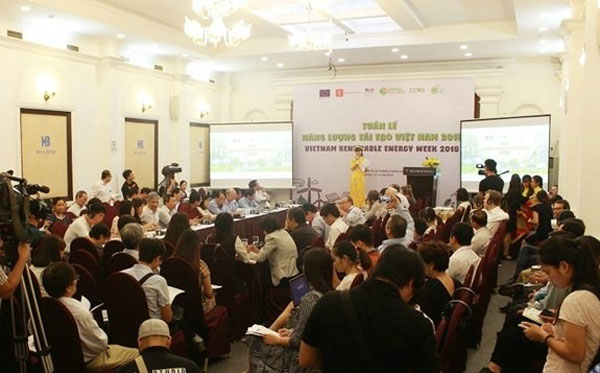
The Vietnam Sustainable Energy Alliance (VSEA) and the Climate Change Working Group (CCWG) kicked off the Vietnam Renewable Energy Week 2018 in Hanoi yesterday.
 |
| The Vietnam Sustainable Energy Alliance (VSEA) and the Climate Change Working Group (CCWG) kicked off the Vietnam Renewable Energy Week 2018 in Hanoi yesterday. |
The Vietnam Sustainable Energy Alliance (VSEA) and the Climate Change Working Group (CCWG) kicked off the Vietnam Renewable Energy Week 2018 in Hanoi yesterday.
The event, which takes place until August 26 in Hanoi, HCM City and Can Tho, establishes a forum for multi-stakeholders to remove obstacles and accelerate renewable energy development for all in Vietnam.
It also aims to raise public awareness of the feasibility and benefits of renewable energy and call for concrete actions, as well as launch the ‘Million Green Houses for Vietnam’s Prosperity’ concept and mobilise stakeholders’ interest in jointly implementing this programme.
With the message ‘Clearing the path for renewable energy to every home in Vietnam’, the 3rd Renewable Energy Week involves a chain of inter-related activities, including workshops, seminars, field trips, exhibitions and other events.
The week will conclude with the Run for Renewable Energy 2018 at the EcoPark urban area in Hanoi, which is expected to attract about 700 runners.
According to Nguy Thi Khanh, Executive Director of the Green Innovation and Development Centre (GreenID) – a member of VSEA, the week includes five main events held in the three big cities and 18 side events nationwide, expected to be attended by about 2,300 delegates and more than 10,000 followers on the fan page and website.
The Million Green Houses concept was co-initiated by GreenID and Green Asia with the goal of promoting the use of renewable energy and power-saving solutions, waste management at home, rainwater collection and use and tree planting.
Renewable energy is playing an important role in rural development in Vietnam, helping to increase incomes for farmers and modernise agricultural production.
Apart from bringing economic benefits to rural areas, renewable energy is also a domestic energy source that can help Vietnam become more proactive in its energy supply and reduce its dependence on fluctuations in the global oil, coal and gas prices.
In 2015, the Prime Minister approved a renewable energy development strategy by 2030 with a vision to 2050, which targets an increase in the ratio of power generated from renewable energy to 32 per cent by 2030 and 43 per cent by 2050.
The national project for power development in 2011-2020 also identified developing renewable energy as a breakthrough to ensure the nation’s energy security, and reduce negative impacts from generating power on the environment.
There are some 50 wind power, and more than 100 solar power projects, along with a number of biomass projects being developed in the country.
(Source: VNS)




